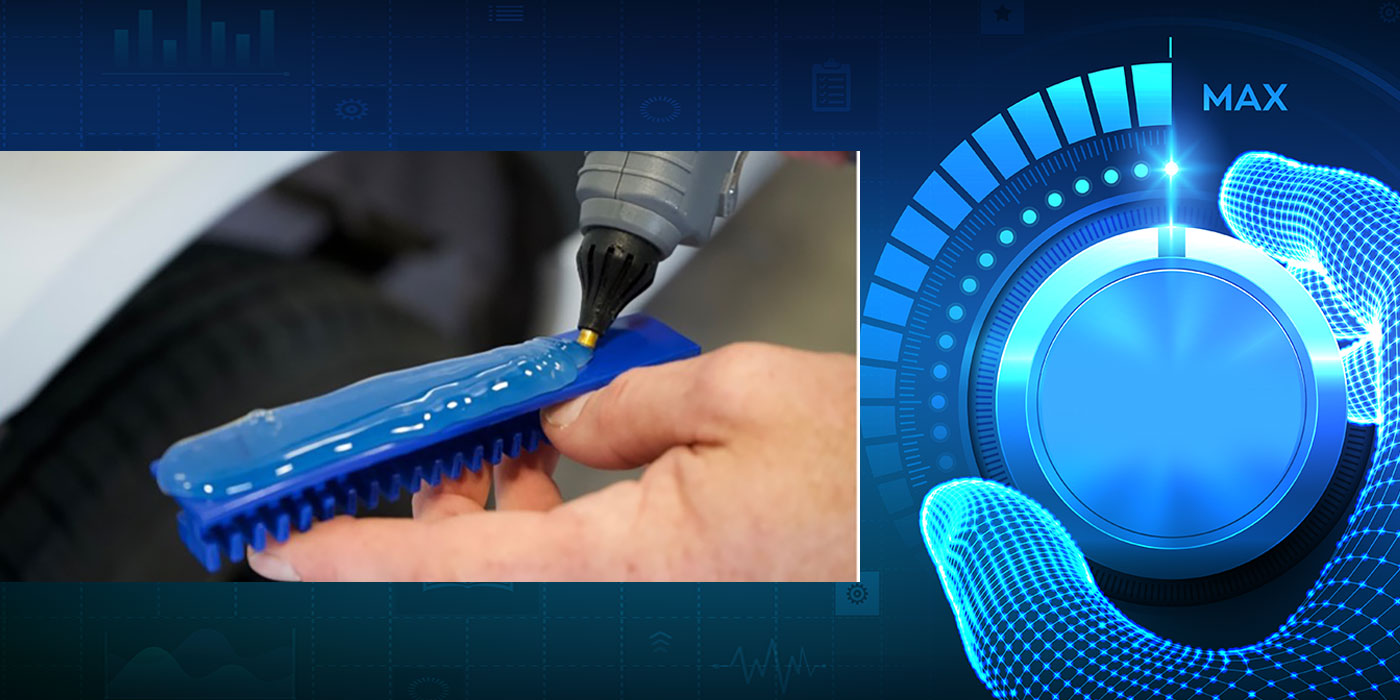Integrity is doing the right thing, even when no one is watching.” Perhaps you recognize that quote from C.S. Lewis. Clay Hoberecht, owner of Best Body Shop in Wichita, Kan., grew up in a home where integrity was at the core of who you are as a person. Integrity proved to be the foundation upon which Hoberecht built himself and his business.
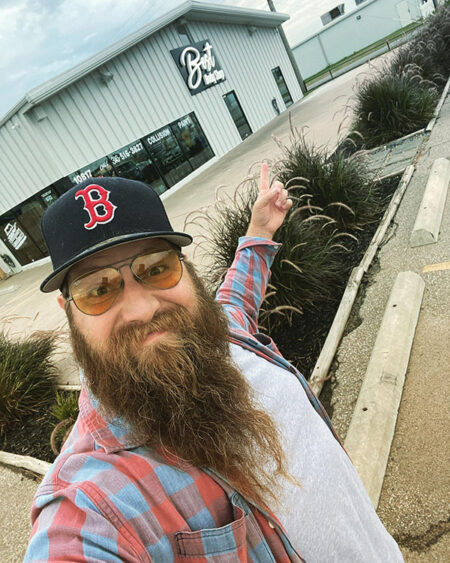
“I was just raised by a father that poured a cement foundation of integrity in my life. In fact, I kind of joke with some of my friends, especially back when I went through a party phase … I wasn’t always full of integrity, but there were certain times where I remember thinking to myself that I wish I didn’t know that this was wrong. There was always this internal compass of knowing the right from wrong, and it’s always been very, very, very clear to me. I might not know how to go about starting a business or doing certain things, but I always know what’s right and what’s wrong.”
Ever since he started his business, Hoberecht has been setting the stage — one job, one video at a time — and inviting others to join him in improving the integrity of the collision repair industry.
Firm Foundation
Often, entrepreneurship runs in the blood. But just as a seed needs water to grow, so too does that entrepreneurial spirit need a constant flow of nourishment. Hoberecht credits both his parents with providing that sustenance.
“I grew up in a non-traditional home with a dad that owned a couple of his own businesses. He had a massive influence on my out-of-the-box thinking, and my mom influenced a significant amount of my confidence with her constant reassurance,” Hoberecht says.
After being homeschooled through high school, Hoberecht found himself in need of a job. Though he had worked in various roles for his father already, he realized he wanted to get a job on his own. One day, when he was around 17 years old, Hoberecht was sitting in the back of his dad’s car as they drove past a body shop. The garage doors were open, and as Hoberecht looked inside, he wondered what went on there. That look planted the seed of curiosity about collision repair.
He decided to pay a visit to a body shop owner his mother knew and see if he could get a job. But when Hoberecht applied, the owner told him that without any experience, he couldn’t hire him. So Hoberecht went to apply at the body shop that initially fueled his interest … and received the same answer. After visiting every body shop in Wichita, he found himself in a pickle, because no one would hire him without experience, but they all told him not to go to school for it either.
“So I got creative, and I think this is where the entrepreneurial blood kind of showed, and I didn’t know it was entrepreneurial blood until much later in my life. But I actually went and got a job at Walmart — third shift — and then went back to the first shop and said, ‘Hey, I’d like to start Monday, but I’ll work for free.’ And so, I actually worked at that auto body complex for a year for free while working at Walmart to pay my bills,” Hoberecht relates.
Over the next few years, Hoberecht went on to work at a few different body shops and eventually landed at a hot rod shop that really sparked his interest, especially in fabrication. He developed such a passion for it that he then opened his own business, C Hoberecht for Customs. But he got tired of having to explain the name and spell it to customers. So a year or two later, he ended up changing the name — all because of an employee’s snarky remark.
“My employees would always come to me and ask, ‘What should we do here?’ There’s a lot of variables, especially in the collision repair world, but in the hot rod world as well. And I remember I always answered the same way: ‘What’s best for the customer? What’s the best way?’ And I remember one of my employees getting pretty pissed off, and he goes, ‘Why don’t you just call the place Best Body Shop?’”
And that’s just what he did.
The Art of Letting Go
Throughout his entrepreneurial journey, integrity has been at the heart of Hoberecht’s business practices. And once more, it came from the foundation set by his parents.
Culture has always been of utmost importance to Hoberecht’s business — and he hasn’t been afraid to ask for help in making sure his shop operations run smoother. After receiving a copy of the book, “The Five Dysfunctions of a Team” by Patrick Lencioni, Hoberecht worked with coaches and Table Groups over a period of years to cultivate a culture of trust in his shop. It was during this time that Hoberecht realized that he’s not a very good manager.
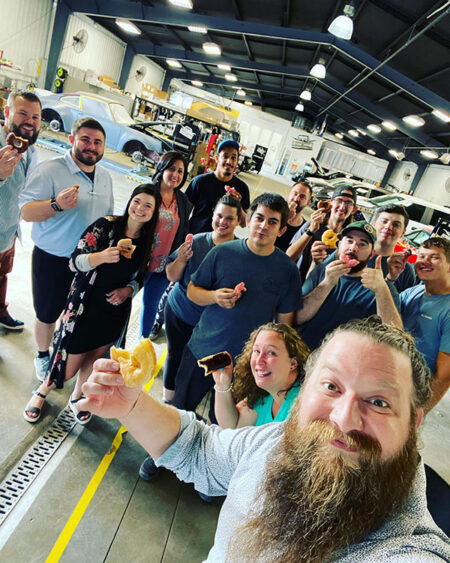
“I’m a good entrepreneur, I’m good at starting, but when it comes to systems and processes and the lack of a roller coaster, that’s not me,” Hoberecht confesses. As a result, he moved one of his staff with management skills into a general manager position, which left Hoberecht to be solely in an ownership role. Giving up daily operations was incredibly freeing, Hoberecht admits. Even so, it wasn’t easy to just let go.
“It was grueling at first. You watch your cameras, you are watching your employees, and you’re not there anymore, and you’re not really supposed to say anything, and you’re looking at the numbers. But again, this is where having a coach there has been unbelievably helpful. I remember calling [our coach] one night, and I’m like, ‘Hey, man, I don’t know when I should be butting in, when I shouldn’t, because sometimes these guys — you have to learn from failing. I know I did, but I also don’t want to abandon ship, right?’”
His coach pointed out that Hoberecht owns a cell phone, his manager owns a cell phone, and Hoberecht only lives five minutes away from the shop. “He’ll call you,” he said. So Hoberecht cut back his hours and told his general manager he would only come in for half-days from then on.
“And what I noticed is he rose to the occasion because he didn’t have somebody looking over his shoulder. I was able to make decisions that were easier for me. I stepped back and out of the situation — made a world of difference,” Hoberecht says.
Show Me Your Soul
Collision repair shops often face a moral dilemma: If you disagree with the insurance company on the best way to repair a vehicle to pre-loss condition, do you cave in to the insurer’s demands or stand your ground? As the BodyShop Business 2023 Industry Profile notes, 74% of body shops believe they lose business due to insurer steering, so getting on the wrong side of an insurer can be costly. But is it worth the cost of your principles?
Hoberecht doesn’t think so.
“Vehicles need to be repaired based on manufacturer’s guidelines, because the engineers have designed that vehicle to absorb energy and divert that energy away and around an occupant, and at the same time read that energy at hundreds of thousands of seconds and communicate to the restraint system that saves your life. At the same time, that restraint system can also potentially end that life if it’s not used in the right timing,” Hoberecht asserts.
While Hoberecht admits that OEMs have been communicating more clearly on how to repair vehicles in recent years, he says there’s still plenty of confusion. As such, he understands that repairing vehicles per the manufacturer guidelines is tough — but he’s also disappointed by how few shops he sees following those OEM guidelines.
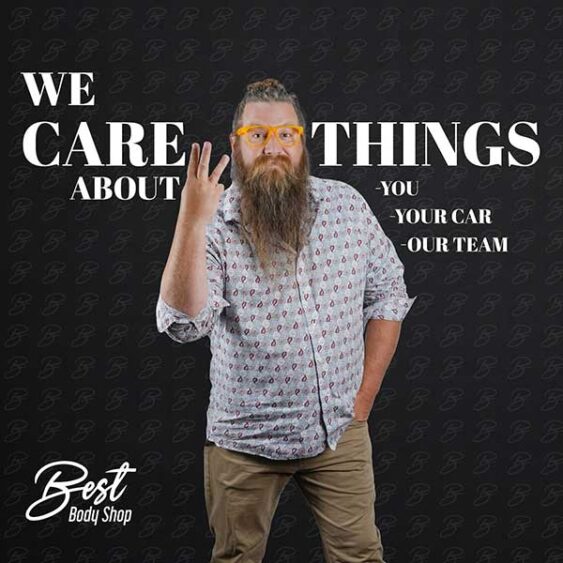
“Most body shops don’t even know how to access that information, let alone know how to navigate through it, let alone know how to implement it in a shop setting. Now, my immediate question after that is: why not? And there’s just a lot of corruption in our industry, a lot of focus on money instead of safety. Something that we say at our shop quite often to our clients is, ‘There’s some things that are worth more than money, and your safety is one of them.’ You couldn’t pay us to repair a car incorrectly. In fact, we’ve had cars picked up and towed to other shops because we would not go against the manufacturer’s guidelines.”
So how does Hoberecht make sure his techs are following the strict moral compass he wants his shop to have? By having them get naked — emotionally.
“If you want to see real results in any kind of organizational period at all, you’re going to have to have a certain amount of trust and love. The reality is that the majority of people have been trained to almost self-protect in almost every setting. And if you can get a team to actually show up and just get naked emotionally with each other and with you, then you can actually find the problems in your organization faster. And it builds a good relationship. How you implement it is you go first,” Hoberecht explains.
Of course, it’s also difficult for owners to open up and show anxiety to their staff. However, if, for instance, you admit to your staff one week that there’s not enough money in the account to make payroll and that you’re worried about it, your staff members will understand how real a problem is — and they’ll start to reciprocate, admitting that certain processes are being done the wrong way or that they didn’t charge enough for certain repairs.
It ends up creating an openness, where people can be honest without fear of hurting the relationship between boss and employee, Hoberecht says — and that makes all the difference.
Same Kind of Humble, Hungry and Smart as Me
Retraining staff to speak up isn’t the only mental reprogramming Best Body Shop has to do. Because Hoberecht runs his shop “the right way” — that is, repairing a car to pre-loss condition per the manufacturer’s guidelines, no matter what shortcuts insurers might want to take — he often finds it difficult to hire industry veterans who might be set in their ways.
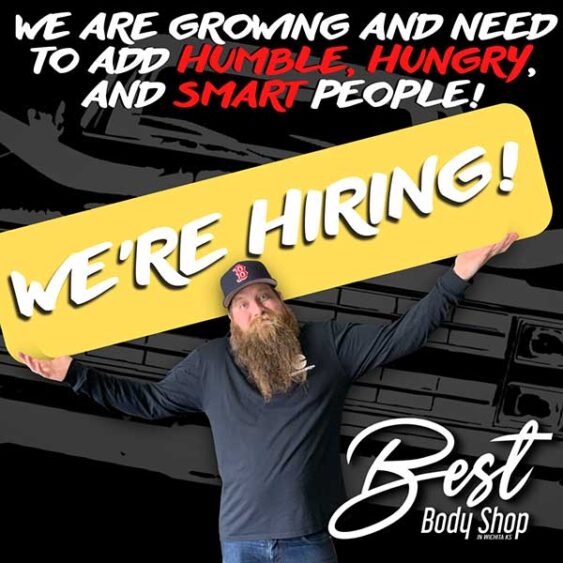
“We really hire outside of the industry as much as possible, love it or hate it. At the end of the day, the majority of the collision repair industry is full of people that have been doing it the wrong way for so long that it’s a practice now. And so to retrain that out of people is what we have found to be more of a challenging mountain to climb than just training the right way from the beginning,” Hoberecht explains.
In fact, Best Body Shop currently only employs one person that came from another shop; everyone else started out in other industries. The bar to pass at his shop doesn’t involve technician skills; rather, it all comes down to being humble, hungry and smart.
“When [we’re] able to go through an interview process, [we ask]: Is this person humble enough? Is this person selfless? Are they hungry to change and to drive? And even if everybody else is doing it another way, are they hungry enough to continue doing it the way that no one else is? And are they smart? And the smart isn’t just intelligence — it’s emotional intelligence. Do they know that their words mean something?” Hoberecht explains.
With so many businesses across the automotive industry grumbling about the technician shortage, Hoberecht’s attitude towards experienced techs might seem strange. However, his own struggles of trying to break into the collision industry informed much of his mindset, and he has a plan for getting those humble, hungry and smart job candidates up to speed on their repair skills. Best Body Shop puts new techs through a training program that sets them up alongside more experienced techs to teach and mentor them until they are ready to work on their own.
Fight Like a Brave
Best Body Shop doesn’t just educate newcomers into the collision repair industry, however. A look at the company’s YouTube and Facebook pages will show dozens of consumer and industry education videos — everything from helping drivers understand their rights during the insurance claims process to different techniques that the company uses when repairing cars (or rants about repair techniques that insurance companies want him to use that he refuses to). These videos have given him a reputation for being an anti-insurance guy, but the way Hoberecht sees it, it’s not an insurance company’s fault if a car is repaired incorrectly — it’s the body shop’s fault. Collision repairers are the ones with the tools doing the work, after all. For that reason, Hoberecht wishes to see less blame and more accountability and responsibility in the industry.
Hoberecht feels that this strained relationship between insurers and repairers is one reason shop owners can’t attract techs: They are taught the correct ways to repair a car … but then they’re asked to repair cars incorrectly because of insurance partners’ demands.
“I’ve never met a technician that wants to repair a car incorrectly. I’ve never seen a technician that’s like, ‘Oh, well, I just don’t want to change.’ In fact, they love some of the new technology and some of the new tools,” Hoberecht asserts. “But I get a significant amount of phone calls, emails, text messages, messages through Instagram and Facebook, all from technicians and managers that all say the same thing: I wish we could do the right thing. So, if you ask how to bring people into the industry, there’s not going to be a silver bullet or a magic wand. You’re going to actually have to do things that are challenging for you to make their life easier. In other words, buy the tools and equipment that it takes to repair cars correctly, train your technicians, and then allow them to do their job correctly. And whatever you have to do in the office between you, your customer and the insurance company, that’s why you’re the owner. Figure it out.”
Hoberecht’s no-nonsense attitude is a refreshing change from the endless cycle of blame that is the battle between insurers and collision repair shops. After all, change can’t come in an industry if its own people are afraid to stand up and fight back. With Hoberecht singing his anthem of integrity into the mic for all collision repairers to hear, he stands out on stage as a true Vehicle Care RockStar.
To nominate someone you believe is a Vehicle Care RockStar — an individual who is making powerful and positive change in today’s collision repair industry — click here.


